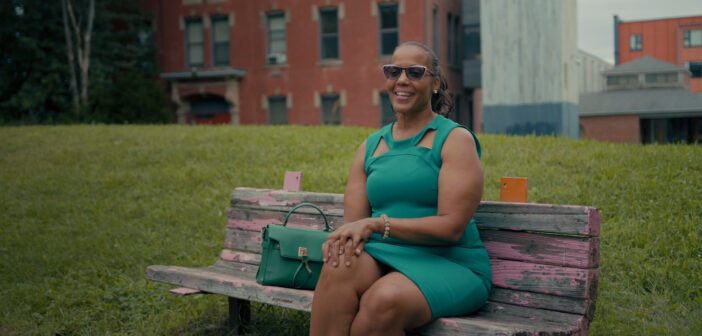A new initiative by the Legorreta Cancer Center aims to improve clinical trials for people of color by featuring candid interviews.
For Rochelle Ives, the John Hope Settlement House in Providence has symbolized a lifelong connection with her community.
“My sisters and I used to go to John Hope daily, as well as many a lot of the kids in the neighborhood. I just love this place and even my kids, nieces, nephews, and my grandchildren went there, whether for daycare, before and after school care, and day camp,” says the longtime Brown staff member.
The facility houses a childcare center, classrooms, two gymnasiums, and offers youth development programs throughout the year. The community mainstay took on an even deeper meaning for Ives, administrative program manager and executive assistant to the vice president of Dining Services, when she selected it as a backdrop to talk about her greatest struggle: her battle with breast cancer.
Her story is part of a new initiative—Color of Cancer—by the Legorreta Cancer Center. Ives and other cancer survivors are featured in a series of upcoming videos aimed at destigmatizing clinical trials for cancer treatment in communities of Color.
“I wasn’t nervous until I started talking,” Ives says. “There was one time where I got choked up, but it got easier the more I talked.”
Assistant Professor of Pathology and Laboratory Medicine Sheldon L. Holder, MD, PhD, the cancer center’s associate director for diversity, equity, and inclusion, is leading Color of Cancer with funding from a Robert A. Winn Diversity in Clinical Trials Award. He received the two-year grant in 2021, and it’s focused on training medical professionals with a commitment to increasing diversity in clinical trials.
“As cancer specialists, we believe that the best therapy is to be treated in a clinical trial,” Holder says. But a big challenge, he says, is that people of Color have disproportionate representation among clinical trial populations. He is using the Winn grant in a variety of ways to help improve these outcomes, including creating a community advisory board to guide their outreach.
The board consists of community members from across Rhode Island and meets monthly. Members come from a diverse set of backgrounds, like local non-profit leaders, a police officer, and even a DJ. Candace Harper, executive director at West Elmwood Housing Development Corporation in Providence and a member of the advisory committee for Brown’s Swearer Center, says joining the board was a natural extension of her everyday work.
“We are all about making sure to provide resources for our community, particularly for things that are concerned with social determinants of health,” Harper says. “‘Health and wellness’ is a big umbrella, and this is a good intersection of the work I do on a daily basis.”
The board noted stigmatization of cancer was a recurrent theme in communities of Color, as many people may avoid talking about it—or sharing their diagnoses at all.
“When the board met, we really believed that what might be more effective than just education is developing relationships,” Holder says. “People are more likely to change their behavior if someone they have a relationship with tells them that they should do something, rather than just because it’s good for their health.”
The board eventually settled on creating a video campaign featuring candid interviews with locally recognizable faces from across Rhode Island. Ives, who connected with the project through her Alpha Kappa Alpha sorority sister Candace Harper, was enthusiastic about participating. In her video, Ives shares the challenges of chemotherapy and of balancing her personal life with treatment, her hair loss, and more. At first, Ives felt she needed to keep her struggles private, but in hindsight, and now living cancer-free, she realized how much she needed the support. She appreciated the initiative’s goal and how it can demonstrate to communities of Color how imperative it is to have people with you throughout the journey.
“It’s OK to get tired, just don’t give up. The important thing is to stay focused on getting well,” she says.
Color of Cancer hosts regular meet-and-greet events called Cancer Talk Café to allow community members to visit and talk with Legorreta Cancer Center clinicians. Videos for the Color of Cancer will be released gradually into 2024. Visit www.colorofcancer.live for more information.




